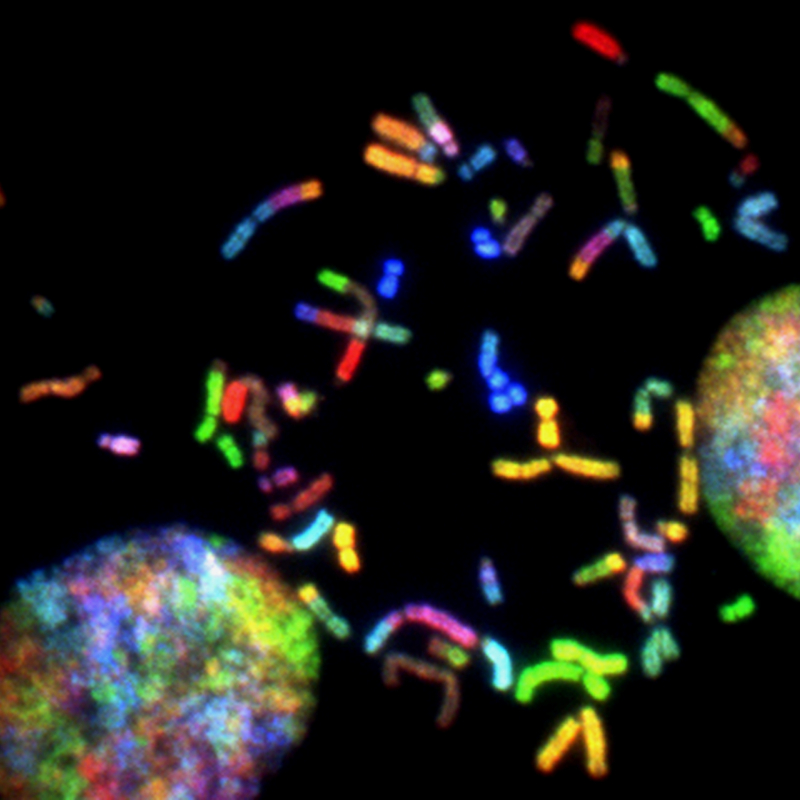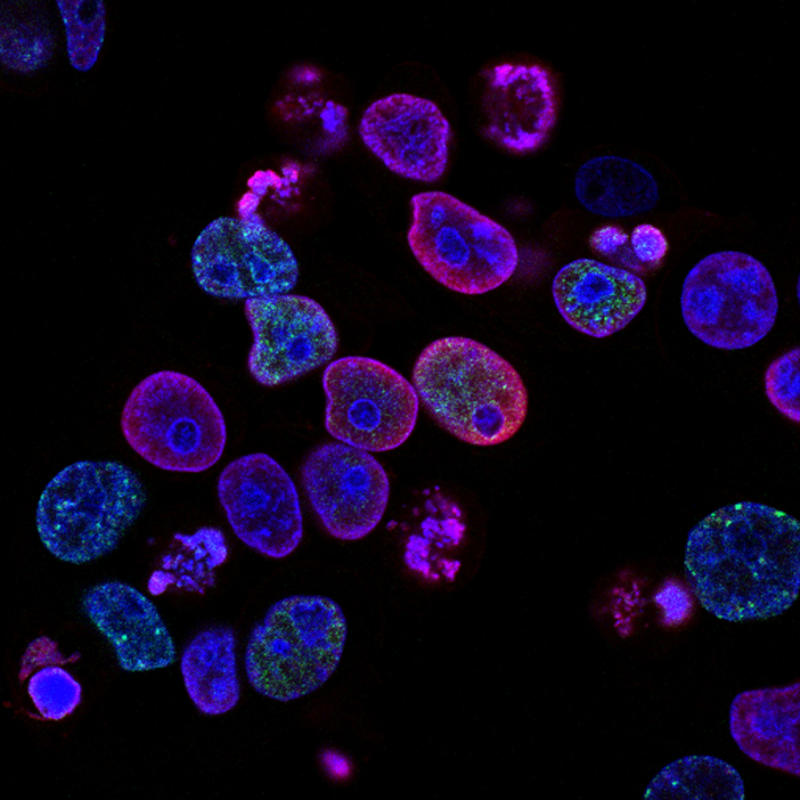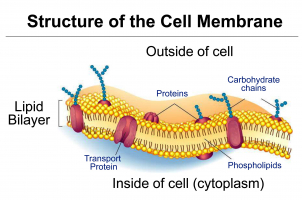Top 10 Best Books On Cell Biology
Cell biology is a fascinating and complex field that explores the intricate workings of the smallest unit of life - the cell. If you're looking to deepen your ... read more...understanding of this subject, there are plenty of excellent books on cell biology to choose from. In this article, we'll take a closer look at some of the best books on cell biology, ranging from introductory texts to more advanced and specialized works.
-
Cell Biology, Genetics, Molecular Biology by P.S. Verma is an exceptional textbook that provides a comprehensive introduction to the world of cells and molecular biology. This book is an ideal choice for students who are looking for a detailed and engaging textbook that covers the basics of cell biology, genetics, and molecular biology.
The author, P.S. Verma, is a renowned biologist who has been teaching and researching in the field of life sciences for over four decades. He has authored several books on biology and his expertise in the subject is evident in this book. In this book, Verma has incorporated his extensive knowledge and experience to create a textbook that is not only informative but also easy to understand.
The book starts with a brief introduction to the cell, its structure, and functions. It then moves on to the fundamentals of genetics, covering topics such as DNA replication, transcription, and translation. The book also covers the mechanisms of gene expression, gene regulation, and the genetic basis of diseases.
The section on molecular biology provides a comprehensive overview of the biochemical processes that occur within cells. This section includes detailed explanations of enzyme kinetics, metabolism, and signal transduction pathways. The book concludes with a discussion on the applications of molecular biology in biotechnology, medicine, and agriculture.
Author: P.S. Verma
Link to buy: https://www.amazon.com/dp/8121924421/Ratings: 4.4 out of 5 stars (from 604 reviews)
Best Sellers Rank: #4,082,310 in Books
#1,076 in Cell Biology (Books)
#1,850 in Molecular Biology (Books)
#3,333 in Genetics (Books)

Photo by National Cancer Institute on Unsplash 
Photo by National Cancer Institute on Unsplash -
Molecular Cell Biology is a comprehensive textbook authored by Arnold Berk, Monty Krieger, Chris A. Kaiser, Anthony Bretscher, Hidde Ploegh, and Angelika Amon. First published in 1995, the book has been continuously revised and updated to reflect the latest developments in the field of cell biology. It is widely regarded as one of the best books on cell biology and is a standard text for undergraduate and graduate courses in biology, biochemistry, and biophysics.
The authors are all prominent figures in the field of cell biology, with extensive research experience and numerous publications in top scientific journals. Arnold Berk is a professor emeritus of molecular and cell biology at the University of California, Los Angeles (UCLA) and a member of the National Academy of Sciences. Monty Krieger is a professor of biology at the Massachusetts Institute of Technology (MIT) and a fellow of the American Academy of Arts and Sciences. Chris A. Kaiser is a professor and former dean of the faculty of arts and sciences at MIT. Anthony Bretscher is a professor of cell and developmental biology at Cornell University. Hidde Ploegh is a professor of biology at MIT and a member of the National Academy of Sciences. Angelika Amon was a professor of biology at MIT until her untimely passing in 2020.
The book's introduction provides an overview of the fundamental principles of cell biology, including the organization and function of cellular structures, the molecular mechanisms of cell communication and signaling, and the regulation of gene expression. The authors emphasize the importance of understanding these principles in order to comprehend the complex processes that occur within cells and the role they play in health and disease. The book is divided into six main sections, covering topics such as DNA replication and repair, transcription and translation, cell signaling, and the cell cycle. Each chapter includes clear and concise explanations of key concepts, accompanied by helpful illustrations and diagrams to aid in understanding.
Author: Arnold Berk and others
Link to buy: https://www.amazon.com/dp/0716776014/
Ratings: 4.4 out of 5 stars (from 205 reviews)
Best Sellers Rank: #989,987 in Books
#219 in Cell Biology (Books)
#331 in Molecular Biology (Books)
#689 in Biology (Books)

Photo by National Cancer Institute on Unsplash 
Photo by Drew Hays on Unsplash -
Essential Cell Biology is an insightful book that provides a comprehensive understanding of cell biology. The book is authored by Bruce Alberts, Karen Hopkin, Alexander Johnson, David Morgan, Martin Raff, Keith Roberts, and Peter Walter. Bruce Alberts, a renowned scientist, served as the President of the National Academy of Sciences from 1993 to 2005. He has received numerous prestigious awards and is recognized for his contributions to the field of cell biology.
The book serves as a fundamental resource for students and researchers alike. It covers a broad range of topics, including the basics of cell structure and function, cellular metabolism, and cellular communication. The book also delves into specialized topics such as the cell cycle, apoptosis, and cancer biology.
The book's approach is unique in that it presents complex concepts in a clear and concise manner. The authors use a narrative style of writing, providing explanations in the context of real-life scenarios. The book is well-illustrated with color diagrams, tables, and photographs, which aid in the reader's understanding of the material.
The fifth edition of Essential Cell Biology has been updated to reflect recent discoveries and advancements in the field. New topics such as CRISPR-Cas9, gene regulation, and epigenetics have been included. The book also features online resources, including interactive quizzes and animations, to help readers reinforce their understanding of the material.
Author: Bruce Alberts and others
Link to buy: https://www.amazon.com/dp/0815344546
Ratings: 4.5 out of 5 stars (from 732 reviews)
Best Sellers Rank: #152,217 in Books
#27 in Molecular Biology (Books)
#30 in Cell Biology (Books)
#62 in Microbiology (Books)

Photo by National Cancer Institute on Unsplash 
Photo by D koi on Unsplash -
Becker's World of the Cell is a comprehensive textbook on cell biology authored by Jeff Hardin and Greg Bertoni. The book is widely regarded as one of the best resources for students and professionals interested in understanding the fundamental principles of cell biology. With over 900 pages, the book covers the latest research and developments in the field of cell biology.
Jeff Hardin is a renowned scientist and professor of zoology at the University of Wisconsin-Madison. His research focuses on developmental biology and the genetics of embryonic development. Greg Bertoni is also a professor of biology at the University of Wisconsin-La Crosse, where he teaches courses on cell biology, biochemistry, and genetics.
The book is designed to be accessible to students at all levels, from undergraduate to graduate level. It is structured in a way that makes it easy for students to understand the complex concepts of cell biology. The authors use clear and concise language, and the book is filled with helpful diagrams and illustrations that help to reinforce the concepts covered in each chapter.
The first chapter of the book provides an overview of the cell, its structure, and function. Subsequent chapters cover a wide range of topics, including the structure and function of DNA, RNA, and proteins, cell division, and the process of cellular respiration. The final chapters of the book explore topics such as the immune system, cancer, and the evolution of life on earth.
Author: Jeff Hardin and Greg Bertoni
Link to buy: https://www.amazon.com/Beckers-World-Cell-Books-Carte/dp/0134145798/
Ratings: 4.6 out of 5 stars (from 247 reviews)
Best Sellers Rank: #767,333 in Books
#171 in Cell Biology (Books)
#235 in Molecular Biology (Books)
#475 in Biology (Books)

Photo by Adrien Converse on Unsplash 
Photo by Jaron Nix on Unsplash -
The Cell: A Molecular Approach, written by Geoffrey Cooper, is a highly acclaimed textbook on cell biology. This book is widely used as a reference by undergraduate and graduate students, as well as researchers in the field of cell biology.
Geoffrey Cooper is a Professor of Biology and Biochemistry at Boston University, where he has been teaching and researching for over 40 years. He has made significant contributions to the field of cell biology, including research on the regulation of gene expression and the structure of chromatin. Cooper is also a fellow of the American Association for the Advancement of Science, and has received numerous awards for his research and teaching.
The Cell: A Molecular Approach provides a comprehensive overview of the fundamental principles of cell biology, with a focus on the molecular processes that govern cellular functions. The book covers a broad range of topics, including the structure and function of biological molecules, cell membranes, cellular signaling, cell division, and the regulation of gene expression.
One of the strengths of this book is its clear and concise writing style, which makes complex topics easily understandable for students with a limited background in biology. The book also includes numerous illustrations and diagrams, which help to visualize and understand the key concepts.
Author: Geoffrey Cooper
Link to buy: https://www.amazon.com/Cell-Molecular-Approach-Geoffrey-Cooper/dp/1605357073/
Ratings: 4.6 out of 5 stars (from 128 reviews)
Best Sellers Rank: #625,412 in Books
#94 in Developmental Biology (Books)
#135 in Cell Biology (Books)
#191 in Molecular Biology (Books)

Photo by Jaron Nix on Unsplash 
Photo by THAVIS 3D on Unsplash -
Molecular Biology of the Cell is a seminal book on cell biology, authored by Bruce Alberts, a renowned biochemist and science educator. First published in 1983, the book has been a leading reference for students and researchers in the field of cell biology, providing a comprehensive overview of the latest discoveries and research in molecular biology.
Bruce Alberts, who was awarded the National Medal of Science in 2014, is a respected scientist and science communicator. He is currently Professor Emeritus of Biochemistry and Biophysics at the University of California, San Francisco, and served as the editor-in-chief of the journal Science from 1993 to 2008. Alberts is also a co-founder of the Science Education Initiative, which aims to improve science education in universities and colleges.
Molecular Biology of the Cell is a landmark publication that has been revised and updated several times, with the latest edition published in 2019. The book covers a wide range of topics, from the structure and function of cells to the mechanisms of DNA replication and gene expression. It also explores the roles of proteins, enzymes, and other molecular components in cellular processes, such as cell division, signaling, and metabolism.
The book's introduction provides a clear and concise overview of the field of cell biology and its historical development, as well as the organization and content of the book. It emphasizes the importance of understanding the molecular basis of cellular processes and the interconnectedness of biological systems, highlighting the relevance of cell biology to other fields, such as medicine and biotechnology.
Author: Bruce Alberts
Link to buy: https://www.amazon.com/gp/product/B00PWDH4RW/
Ratings: 4.5 out of 5 stars (from 1208 reviews)
Best Sellers Rank: #218,708 in Books
#43 in Cell Biology (Books)
#44 in Molecular Biology (Books)
#76 in Biology (Books)

Photo by THAVIS 3D on Unsplash 
Photo by CDC on Unsplash -
Histology and Cell Biology, written by Abraham L. Kierszenbaum and Laura L. Tres, is considered one of the best books on cell biology. This comprehensive text provides a thorough overview of the microscopic structure and function of cells and tissues.
Abraham L. Kierszenbaum is a professor of pathology and laboratory medicine at the University of California, Los Angeles. He is also an accomplished author, having written several books on cell biology and pathology. Laura L. Tres is a professor of anatomy and cell biology at the Indiana University School of Medicine. Her research focuses on the structure and function of the nervous system.
The book starts with an introduction to the basic concepts of cell biology, including the structure of cells and the molecular processes that occur within them. It then delves into the different types of tissues that make up the human body, including epithelial, connective, muscular, and nervous tissues. Each chapter includes detailed illustrations and photographs to help readers visualize the structures and processes being described.
One of the key features of this book is its clinical focus. The authors provide numerous clinical correlations throughout the text, linking the microscopic structure of cells and tissues to their physiological and pathological functions. This makes the book an invaluable resource for medical students, healthcare professionals, and researchers in the field of cell biology.
Author: Abraham L. Kierszenbaum and Laura L.Tres
Link to buy: https://www.amazon.com/gp/product/0323078427/
Ratings: 4.3 out of 5 stars (from 27 reviews)
Best Sellers Rank: #2,628,621 in Books
#176 in Histology (Books)
#632 in Cell Biology (Books)
#1,305 in Microbiology (Books)

Photo by CDC on Unsplash 
Photo by CDC on Unsplash -
Siddhartha Mukherjee's The Song of the Cell is a gripping exploration of the fascinating world of cell biology. It is a book that delves into the intricate workings of our bodies at a cellular level and illuminates the amazing complexities of the microscopic structures that make us who we are. It is regarded as one of the best books on cell biology.
Mukherjee, a physician and cancer researcher, is also the author of the Pulitzer Prize-winning book The Emperor of All Maladies, which chronicled the history of cancer and its treatment. In The Song of the Cell, Mukherjee brings his signature storytelling style to the world of cell biology, weaving together science, history, and personal anecdotes to create a narrative that is both informative and captivating.
The book is divided into four sections, each one exploring a different aspect of cell biology. The first section introduces the reader to the basic building blocks of life - the cell itself. Mukherjee explains the different types of cells, their structure, and function, and how they work together to form tissues and organs.
In the second section, Mukherjee explores the complex machinery that governs cellular processes, including DNA replication, protein synthesis, and cell division. He describes the intricate interactions between molecules and how they control cellular behavior, providing a glimpse into the stunning complexity of the molecular world.
The third section of the book focuses on the immune system, describing how the body defends itself against invading pathogens and cancerous cells. Mukherjee delves into the history of immunology, tracing its roots back to ancient times and highlighting the major breakthroughs that have led to our current understanding of the immune system.
Finally, in the last section, Mukherjee discusses the role of the cell in disease, from genetic disorders to cancer. He provides insights into the latest research and treatments, offering hope for a better understanding of these diseases and their potential cures.
Author: Siddhartha Mukherjee
Link to buy: https://www.amazon.com/Song-Cell-Exploration-Medicine-Human/dp/1982117354/
Ratings: 4.7 out of 5 stars (from 1482 reviews)
Best Sellers Rank: #1,828 in Books
#2 in Cell Biology (Books)
#6 in History of Medicine (Books)
#10 in History of Civilization & Culture

Photo by Hans Reniers on Unsplash 
Photo by Ousa Chea on Unsplash -
Molecular & Cell Biology For Dummies is a must-read book for anyone who wants to understand the basic principles of cell biology. Written by Rene Fester Kratz, a biology instructor and author, this book offers an accessible and engaging introduction to the complex world of cells and their molecules.
The author's background as a teacher is evident in her writing style, which is clear and easy to follow. She explains key concepts in a way that is both informative and entertaining, using real-life examples and analogies to make the material relatable to everyday life. Whether you are a student of biology, a medical professional, or simply someone who is interested in learning more about the inner workings of cells, this book is an excellent resource.
Molecular & Cell Biology For Dummies is divided into three parts. The first part covers the basics of cell biology, including cell structure, function, and communication. The second part delves into the molecular biology of cells, exploring topics such as DNA, RNA, and protein synthesis. Finally, the third part looks at the various applications of cell biology, from biotechnology to medicine.
Author: Rene Fester Kratz
Link to buy: https://www.amazon.com/gp/product/0470430664/
Ratings: 4.6 out of 5 stars (from 378 reviews)
Best Sellers Rank: #53,660 in Books
#10 in Biology (Books)
#25 in Science & Technology Teaching Materials

Photo by CDC on Unsplash 
Photo by Nataliya Smirnova on Unsplash Copy to clipboard -
The Secret Language of Cells, written by Jon Lieff, is a fascinating book that explores the intricate and complex world of cell biology. In this book, Lieff uses his extensive knowledge and experience in the field of neuroscience to explain the complex processes that occur within our cells. The book is among the best books on cell biology.
As a physician and expert in neuroscience, Lieff has a unique perspective on the world of cell biology. He draws upon his experience and expertise to explain how cells communicate with one another and how they work together to form complex systems within our bodies. He also explores the role that the environment plays in shaping the behavior of our cells and how this can impact our health and well-being.
The book is divided into chapters that focus on different aspects of cell biology, including the cell membrane, the cytoplasm, and the nucleus. Each chapter provides a detailed explanation of the processes that occur within these different parts of the cell, and how they work together to ensure the proper functioning of the organism as a whole.
What makes The Secret Language of Cells unique is Lieff's ability to translate complex scientific concepts into language that is accessible and easy to understand. He uses real-life examples and analogies to explain complex processes and make the information more relatable to the reader.
Author: Jon Lieff
Link to buy: https://www.amazon.com/gp/aw/d/1637742312/
Ratings: 4.5 out of 5 stars (from 132 reviews)
Best Sellers Rank: #246,652 in Books
#49 in Cell Biology (Books)
#54 in Molecular Biology (Books)
#406 in Anatomy (Books)

Photo by CDC on Unsplash 
Photo by CDC on Unsplash























